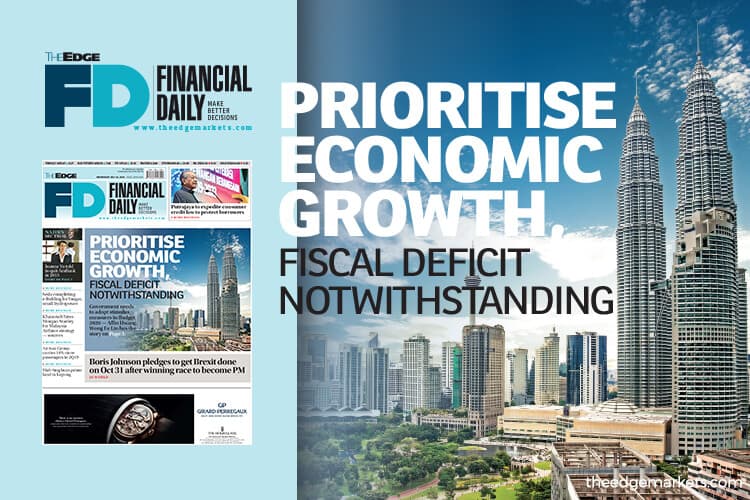
This article first appeared in The Edge Financial Daily on July 24, 2019
KUALA LUMPUR: As long as Putrajaya’s increased spending is for productive development supportive of economic growth, rating agencies are expected to maintain Malaysia’s sovereign ratings even if the fiscal deficit falls short of the targeted 3% in 2020, according to Affin Hwang Investment Bank Bhd.
“From my perspective, even if Malaysia’s fiscal deficit is between 3.2% and 3.4% going into 2020, and not 3% as guided, we still think as long as the higher fiscal deficit is due to rising possible spending in development expenditure [and] supportive of economic growth ... that is a positive move by the government,” said the bank’s chief economist and head of research Alan Tan at a media briefing on the macroeconomic outlook for the global and Malaysian economies for the second half of 2019 (2H19) and 2020.
Fitch Ratings recently affirmed Malaysia’s Long-Term Foreign-Currency Issuer Default Rating at ‘A-’ with a stable outlook but cautioned its weak fiscal position relative to its peers weighed on its credit profile.
Finance Minister Lim Guan Eng earlier this week acknowledged Malaysia will find it challenging to meet its 3% fiscal deficit target for 2020 because of continuing uncertainties from the US-China trade conflict.
“There’s a time lag effect. The full brunt of it, everyone expects it to hit next year,” Guan Eng had told Reuters in an interview.
Tan said the government should not be too concerned about a slightly higher fiscal deficit, but instead “worry about the current global economic conditions”.
He stressed a need to sustain the domestic economy, and to ensure no revenue shortfall in direct taxation collected in the forms of corporate and personal income taxes.
Owing to economic uncertainties, he believes the government needs to adopt stimulus measures in the upcoming Budget 2020, to cushion a slowdown in exports and support the Malaysian economy.
The budget, to be tabled in parliament on Oct 11, is projected to be an expansionary budget containing more business and consumer-friendly incentives for a short-term boost to the economy and as a buffer against external headwinds.
The research house has maintained Malaysia’s forecast gross domestic product (GDP) growth at 4.5% this year, supported by private consumption. Tan reiterated that in the short term, Malaysia would benefit from the trade diversion arising from the US-China trade conflict.
Affin Hwang sees the ringgit hovering at about 4.10 against the greenback by year end based on current fundamentals, before appreciating to 3.9 to 4 next year.
On the possibility of a global recession, Tan cautioned that a full-blown trade war could be seen towards the end of the third or fourth quarter, before spilling over to the rest of the world.
“We don’t see the trade war between the US and China resolving any time soon. There is a strong possibility the US will start imposing US$300 billion on goods to the US,” he said.
The fallout could potentially weigh on global growth as much as 0.5%, trimming the GDP growth to 3.1% in 2020 against the International Monetary Fund’s forecast of 3.6%.
“At 3.1%, that is close to a global recession,” Tan said, noting growth of less than 3% signifies a global recession.
On the equity market, the research house has a year-end target of 1,679 for the benchmark FBM KLCI, a slight 1.4% upside from yesterday’s close of 1,655.67.
As there were unlikely to be new catalysts to excite the market going into 2020, Tan said the research house would adopt a defensive approach, and has upgraded the real estate investment trust (REIT) sector to “overweight”.
Affin Hwang senior analyst Isaac Chow observes the six REITs under its coverage have outperformed the KLCI in four of the five past years.
“Moving into 2H19, the REITs’ defensive earnings, stellar yields and a low correlation to benchmark indices make them a good investment proposition during economic uncertainties ahead,” he said. REITs under its coverage with “buy” calls include KLCC, Axis and Sunway.